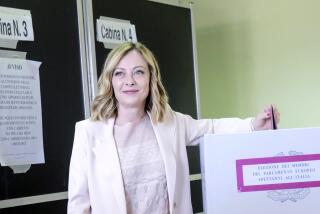Bosnia Municipal Elections Hold Little Promise
- Share via
STOLAC, Bosnia-Herzegovina — To understand the significance, and perhaps the futility, of municipal elections that start today in Bosnia, look at Stolac, a picturesque riverside town of tall pines and destroyed mosques.
Designated two years ago as an internationally financed pilot project for the return of war refugees, Bosnian Croat-controlled Stolac has received only 51 Muslim families out of thousands who fled or were expelled.
Blocking the returns at every step, say humanitarian workers, are the sitting mayor and former police chief of Stolac, Pero Raguz, and a City Council full of hard-line Croat nationalists.
In cities and towns throughout Bosnia-Herzegovina, local officials are de facto mayors and council members, appointed during the war by nationalistic political parties and wholly unaccountable to citizens. In many places such as Stolac, they are also the same people who conducted ruthless, ethnic-based expulsions and want to maintain the “ethnic purity” of their municipalities.
The elections, to be held over two days and after numerous postponements, are intended to replace such officials with legitimate authorities and take another step toward the building of postwar institutions in Bosnia. That in turn is meant to transform Bosnia into a functioning country that can maintain peace once U.S.-led NATO forces withdraw.
But in many sensitive areas that saw vicious fighting, and where refugee returns are most critical, the elections may not change leadership or attitudes sufficiently to help people go home--a largely unfulfilled right considered the backbone of accords that ended Bosnia’s war in late 1995.
In Stolac, for example, victims and human rights officials say that former Mayor Andjelko Markovic supervised, along with Raguz, the “ethnic cleansing” campaigns that emptied the town of more than 8,000 Muslims in 1993. Today, Markovic is the leading candidate representing the Bosnian Croats’ main nationalist political party, and, as such, he is assured victory.
And while Muslims will undoubtedly be elected to Stolac’s new City Council, they will be outnumbered by Bosnian Croats who take their instructions from party leaders in Zagreb, the capital of neighboring Croatia.
As in last year’s presidential poll, the nationalist ethnic parties that led Bosnia to war are expected to win most local seats. Little progress has been made in creating independent media or other means of expressing alternative political viewpoints. If anything, the most militant of the chauvinistic, ethnic-baiting rhetoric has only become worse.
The Organization for Security and Cooperation in Europe, or OSCE, which is conducting the elections, has been unusually secretive about numbers and has refused to release detailed registration information.
The OSCE also struck last-minute deals with Bosnian Serb and Bosnian Croat nationalist parties that--realizing they stood to lose several key cities to their ethnic rivals--were threatening to boycott the poll.
The Serbs’ main nationalistic party, the Serbian Democratic Party of indicted war crimes suspect Radovan Karadzic, was persuaded to participate after the OSCE said it “found” 2,900 more Bosnian Serb voters in the disputed city of Brcko. The OSCE insisted that the names had been left off registration lists accidentally, but independent analysts say the number is enough to tip the balance in favor of the Serbs and give them control of the once-Muslim city.
Bosnians had to re-register this year for the elections; those who had been expelled or displaced by the war could register in their prewar hometowns. Consequently, cities now populated almost exclusively by one ethnic group have a large number of voters from the ethnic group that originally lived in them.
In Stolac, where the red checkerboard emblem that symbolizes Croatian nationalism is painted on every single building, 6,500 Croats are registered to vote and only about 5,500 Muslims, almost all of whom live in exile. (Because the OSCE refuses to release details, these statistics were obtained from other reliable sources.) Before the war, Muslims made up 45% of Stolac’s population, to 32% Croats, but several thousand Croats driven from other parts of Bosnia have now settled here. Most of Stolac’s 3,970 Serbs left or were expelled in 1992.
For the few Muslims who have returned--with United Nations assistance, donated building supplies and the watchful security of Spanish NATO troops--the climate in Stolac remains hostile in large part because of Mayor Raguz and the hard-liners, international officials say.
Across from the ruins of one mosque, under pine and palm trees, Slobodanka Sutalo, an unemployed mother and Bosnian Croat refugee, said she would vote today for the Croat nationalist party, even though she had no idea who was running.
“If my father died in this war, fighting for our fatherland, then I must vote as everyone else does,” Sutalo, 31, said. “The politicians decide.”
More to Read
Sign up for Essential California
The most important California stories and recommendations in your inbox every morning.
You may occasionally receive promotional content from the Los Angeles Times.














